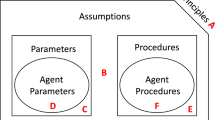Abstract
We show that when agents become informationally negligible in a large economy with asymmetric information, every ex ante efficient allocation must be incentive compatible. This means that any ex ante core or Walrasian allocation is incentive compatible. The corresponding result is false for fixed finite-agent economies with asymmetric information. An example is also constructed to show that the ex post version of the result does not hold. Furthermore, we show that the result is sharp in the sense that it will fail to hold if one relaxes any of the main assumptions, namely, strong conditional independence on the information structure, strict concavity on the utility functions, type independence on the utility functions and endowments.
Similar content being viewed by others
References
Feller W. (1968) An Introduction to Probability Theory and its Applications, 3rd edn. New York, Wiley
Glycopantis D., Yannelis N.C., eds. (2005) Differential Information Economies. New York, Springer-Verlag
Hahn G., Yannelis N.C. (1997) Efficiency and incentive compatibility in differential information economies. Econ Theory 10: 383–411
Hammond P.J., Sun Y.N. (2003) Monte Carlo simulation of macroeconomic risk with a continuum of agents: the symmetric case. Econ Theory 21: 743–766
Holmström B., Myerson R. (1983) Efficient and durable decision rules with incomplete information. Econometrica 51:1799–1819
Loeb P.A., Wolff M., eds. (2000) Nonstandard Analysis for the Working Mathematician. Dordrecht, Kluwer
McLean R., Postlewaite A. (2002) Informational size and incentive compatibility. Econometrica 70: 2421–2453
Prescott E., Townsend R. (1984) Pareto-optima and competitive equilibria with adverse selection and moral hazard. Econometrica 52: 21–45
Sun Y.N. (2006) The exact law of large numbers via Fubini extension and characterization of insurable risks. J Econ Theory 126: 31–69
Sun Y.N., Yannelis N.C. (2007) Perfect competition in asymmetric information economies: compatibility of efficiency and incentives. J Econ Theory 134: 175—194
Wang Y.H. (1979) Dependent random variables with independent subsets. Am Math Monthly 86: 290–292
Author information
Authors and Affiliations
Corresponding author
Rights and permissions
About this article
Cite this article
Sun, Y., Yannelis, N.C. Ex ante efficiency implies incentive compatibility. Economic Theory 36, 35–55 (2008). https://doi.org/10.1007/s00199-007-0261-4
Received:
Revised:
Published:
Issue Date:
DOI: https://doi.org/10.1007/s00199-007-0261-4
Keywords
- Asymmetric information
- Pareto efficiency
- Incentive compatibility
- Negligible private information
- Strong conditional independence
- Exact law of large numbers



